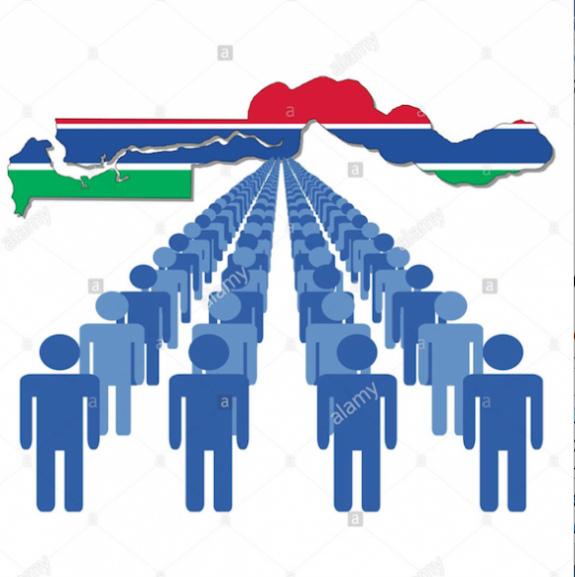If Singapore Did It, So Too Can The Gambia
By Tumbul Trawally in Seattle, USA
According to the United Nations Development Index, it took Britain — birthplace of the Industrial Revolution — 200 years to achieve her current standard of living while it took Singapore and South Korea 40 years to achieve comparable standard of development. Singapore gained her independence in 1963, two years before Gambia’s independence. The Korean peninsula was mired in civil war in the 1950s. Britain, which is the pioneer of Industrial Development, relied on “trial and error or learn as you go” on her match toward economic prosperity to attain her current standard of living. Singapore and South Korea avoided those arduous steps of development, Trial and Error, because the books and materials on economic development were widely available, by the 1950s and 60s. They, therefore, were able to shorten their development route.
Singapore joined the Malay Union with Malaysia after her independence in 1963, but withdrew in 1965, citing ethnic and religious discriminations as the reasons for withdrawal. Every company in Malaysia has to have a majority Malay (main ethnic group) shareholder. This blatant discrimination stifles growth! The minority Chinese and Indian ethnicities felt discriminated against. People denied a sense of belonging will never perform at their optimum in national development. Discrimination in any form, be it tribal, ethnic, race, religious, or gender does not enhance the economic prosperity of a country. Don’t get me wrong: Malaysia is still a prosperous country, but she could have done better, with less discrimination of minorities. African countries would die to have Malaysia’s levels of economic prosperity.
Singapore’s GDP in 1965 was 970 million US dollars; Senegal’s GDP was 960 million US dollars—a 10 million US dollars shy of Singapore’s. Fast forward 53 years to 2018: Singapore’s GDP is 324 billion US dollars; Senegal’s GDP is 16 billion US dollars. While Senegal had a glacial growth, Singapore had an (out-of-this-world) meteoric growth. The disparity is astounding! The differences are partly due to political will, work ethic, minimum corruption and tribalism, which African countries, in general, lack. The catastrophic economic growth of Senegal is summed up in the GDP numbers. The sad part is that Senegal is among the African countries doing well economically, partly because it is among the least tribal as almost everyone speaks and understands Wolof, and has had a stable government since independence.
Another example of a country that defied the slow trajectory of economic development is the United Arab Emirates (UAE). The UAE is not as endowed with fossil fuels as her neighbors, Saudi Arabia and Qatar. In fact, a few decades ago, pearl fishing was the biggest industry in the UAE and falcon hunting was its favorite pastime. Today, high finance/commerce, travel, and tourism are its biggest industries; and fast car and thorough-bred horse racing are its favorite pastime. The kingdom has diversified her economy and is today an envy of the world. Dubai, in the UAE, has become the hub of air travel between Asia and the rest of the world. Beirut, in Lebanon, used to be what Dubai is today. The Lebanese civil war gave UAE/Dubai a golden opportunity to run away with it— and boy, as it did. The economic dynamism of Asia offered Dubai another advantage as a hub of air travel between Asia and the rest of the world. Beirut was geostrategically located when Europe was the center of international business. That dynamic is slowly, but surely, shifting towards Asia.
Some of you may remember when trucks hauled goods from Leman Street in Banjul and Churchill’s Town to Guinea Bissau, Guinea Conakry, Sierra Leone, Mali, Senegal, and Mauritania. Sir Dawda, the late Sheriff Ceesay, B. B. Darboe, Dr. Jabez Langley, and Sarrah Janha had a vision for the Gambia. They wanted Gambia, a small, resourceless country, to be as prosperous as Singapore, Denmark, Switzerland, Malta, or Luxembourg. In contrast, small and resourceless countries as ours was only to be derailed by an uneducated, tribalistic, narcissistic, psychopathic, and a murderous kleptocrats. Gambia can be prosperous with the proper socio-economics policies in place.
However, the Gambian population has a role to play. It must stop the glorification of ill-gotten wealth for economic development to take hold. That goes beyond economics, but it goes to the moral fabric of our society. Remember, government does not operate in a vacuum. The Ministry of Finance and Economics Affairs can hire the brightest economists, but everything will amount to a “Naught” unless the society, at large, ceases to glorify unearned income. The government should adopt a policy of “no—one—is—too—big—to—go—to—jail” and forfeiture of stolen assets. Until such an approach is adopted, economic prosperity will remain elusive. There is corruption everywhere, but there has to be a repercussion for it. That is the only deterrent! Donald Trump’s former campaign manager is languishing in jail for tax evasion; and his former personal lawyer has been sentenced to three years in prison and fined $1.4 million.

